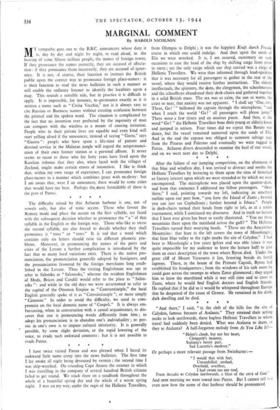After the failure of our jumping competition, on the afternoon
of that blue and windless day, I was invited to distract and soothe the Hellenic Travellers by lecturing to them upon the sites of historical or literary interest upon which we were stranded or by which we were encompassed. The microphone was placed upon the quarter-deck, and from that eminence I addressed my fellow passengers. "Over there," I said, pointing towards my left, indicating an amethyst outline upon our port bow, " you have the Island of Zante ; beyond you can just see Cephallonia ; further beyond is Ithaca." People in deck-chairs turned their heads from right to left, as at a tennis tournament, while I continued my discourse. And in truth no lecture that I have ever given has been so vastly illustrated. " You see those mountains there upon the mainland across the gulf? " The Hellenic Travellers turned their wearying heads. " Those are the Aracynthus Mountains: that haze to the left covers the town of Missolonghi ; that faint blue valley to the right marks the site of Calydon." I had been to Missolonghi a few years laefore and was able (since it was quite impossible for my audience to leave the lecture hall) to give them an exact description of the town where Byron died. Under the great cliff of Mount Varassavo it lies, festering beside its foetid lagoons. There, in the house of the Primate Capsali, Byron had established his headquarters ; from the windows of his sick room he could gaze across the swamps to where Zonte glimmered ; they urged him to leave the marshland while it was still time and to cross to Zante, where he would fmd English doctors and English friends. He replied that if he did so it would be whispered throughout Europe that he despaired of the cause of Greece. He remained in his, dank,
dark dwelling and he died. * *


























 Previous page
Previous page